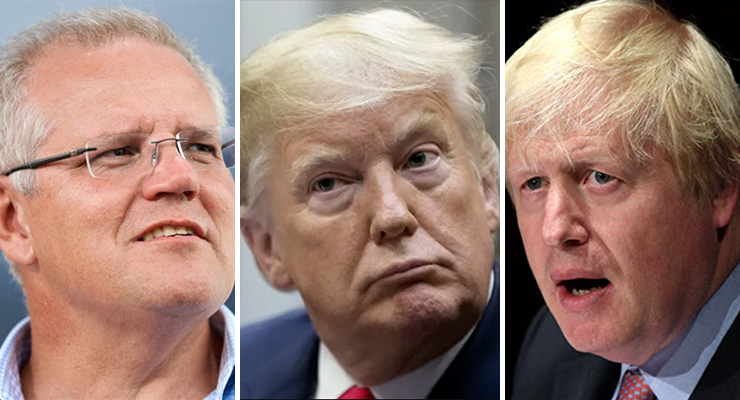
The walls are again closing in for UK Prime Minister Boris Johnson. His leadership is in crisis as two cabinet ministers quit in protest of his handling of sexual harassment allegations. Johnson promoted Chris Pincher to deputy whip despite being aware of groping allegations — Johnson publicly apologised yesterday, prompting the resignations.
It’s like deja vu from across the pond as politicians willingly ignore antisocial, sexist, racist or downright abusive behaviour, only addressing allegations after the public catches on and demands change. But politicians, both in the UK and Australia, seem to be held to a different standard: Australia still doesn’t have a code of conduct for parliamentarians.
Behaviour has to be incredibly poor to prompt change. The bar is on the floor. Politics is somewhat unique in this regard — while many industries have been rocked by improper behaviour allegations, large organisations have boards to be accountable for, share prices to consider and a code of conduct to adhere to.
It seems to have gotten worse under the brash leadership of Donald Trump, Scott Morrison and Boris Johnson, each of whom denies responsibility, deflects blame and protects their inner sanctum at all costs.
While the hard, continuous work of survivors such as Brittany Higgins, Chelsey Potter and Rachelle Miller, as well as advocates and sex discrimination commissioner Kate Jenkins, has exposed Parliament’s toxic culture, providing data and key examples of something many were aware of, it seems our indifference towards poor behaviour in Parliament is changing, at least in Australia.
But it’s strange how much we were willing to overlook things in the first place. It’s not like Morrison, Trump or Johnson are particularly affable or likeable characters (all three had some of the lowest approval ratings in their respective countries political histories).
It’s also not as though no one within Parliament knew the egregious behaviour they were covering up was a secret. There were reportedly multiple people involved in cleaning up the alleged crime scene after Higgins left Parliament while internal complaints lodged by Liberal women went ignored.
It all comes down to protection and power. A massive failure of the Members of Parliament Act in Australia is how easy it is to fire staffers — meaning they may stay silent on issues to hold on to their jobs.
Politicians, as Labor’s last reign proved, can be overthrown and replaced, but the impact this has on the party’s popularity takes a huge hit. This is likely why, despite votes of no confidence against Johnson, he’s held on to his seat.
The public’s support for leaders who refuse to take responsibility is interesting too: despite multiple allegations of sexual harassment against Trump, he (at least in the early days) retained popularity among his voter base. His promises of draining the swamp and improving the lives of middle-class Americans were so lucrative that many were willing to excuse his behaviour of “locker room” talk.
Even in absence of promises, such as Morrison’s lack of action on gendered violence, there’s the promise of stability — change, especially in turbulent times such as COVID-19, is difficult to stomach. For many, it may have been the case of “better the devil you know”.
But as the overthrowing of Trump, Morrison and soon-to-be Johnson has shown, the fish rots from the head. While the tolerance for poor behaviour among parliamentarians may be high, it’s still there — and community attitudes are changing. Scandal after scandal, report after report and allegation after allegation have bettered our understanding of what constitutes abusive behaviour, and many are looking to leaders to call it out.








Such leaders would not remain in Parliament, if the so called honest politicians stood up to such charlatans, and combined to vote “No Confidence in their Leadership’, no such action will occur unfortunately, since such integrity does not exist.
Lying and cheating is the stock in trade of these toxic monsters. Among the worst ever leaders of our three countries.
Why do the conservative parties throw so many dud leaders and ministers? They are entirely transactional and very suspicious of ideas and intellectuals.
As Peter Coldrake’s report has recently concluded, ethical culture requires resolutely ethical leadership, a quality alarmingly absent in any of Morrison, Trump or Johnson. True, a code of conduct would be useful is comparing the ethical response of leaders to misconduct when exposed. But fundamentally, as James Ball point out above, standards of decent behaviour are the bedrock of good government and governance generally. And what Morrison, Trump and Johnson have shown, you can get away with gutter level standards for far too long in government. Johnson looks like he will be the odd man out in this trio of corrupt, incompetent clowns and actually get tossed out before be tossed out by the electorate, ironically because the increasingly alarmed Tories have included that Johnson will meet the same fate as Morrison and Trump ate the next general election.
Trump, Johnson and Morrison, men of no substance, got away with unethical and sometimes even psychotic behaviour because it was almost impossible to do anything about it. They created an environment where they could be as unethical and as incompetent as they were and where their victims were destroyed with lies. So fear stopped people doing anything about the three useless leaders and politicians, who most of us knew were useless as leaders and politicians. People finally reached breaking point and started reacting to them with the final act of voting them out and celebrating this (actually dancing in the streets for Trump’s exit).